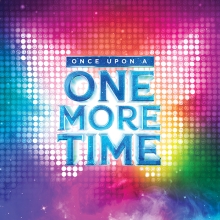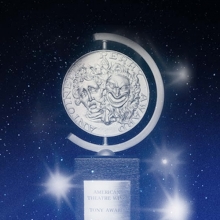During the summer, MTI's office will close at 3 PM ET on Fridays. On Friday, August 30th, the office will close at 1 PM ET for the Labor Day holiday weekend.
Filichia Features: Indeed, What About Luv?
Filichia Features: Indeed, What About Luv?
Two middle-aged character men, one middle-aged character woman, one set, one piano, everyday contemporary clothes (well, okay, one mink coat), and you’re in business.
In fact, you don’t even need the set to do What About Luv? The entire three-character musical takes place on a bridge, so you can easily make do with a backdrop or a painting or even a projection. Whether you work with a community or semi-pro theater (or even one of the nation’s remaining dinner theaters), this is an ideal property.
What will carry the day are Howard Marren’s tuneful music and the hilarious words that inhabit or surround it. Bookwriter Jeffrey Sweet and lyricist Susan Birkenhead did a splendid job of borrowing from Murray Schisgal’s 1964 hit comedy and adding a generous helping of their own wit. The result is a somewhat farcical, somewhat absurdist and always funny musical that is nevertheless truthfully on-target when dealing with the difficulties of marriage and divorce.
When LUV, as Schisgal’s play was simply titled, closed in 1967, only 15 Broadway comedies had ever run longer. Even now, only six more have surpassed its 901 performances.
Alas, What About Luv? hasn’t had as much luck, settling for a couple of off-Broadway engagements. Still, this show will cause both the wives and husbands in your audience to laugh – and laughingly groan – early and often with complete recognition.
You’ll make three of your performers very happy if you produce it. Think about those lovely middle-aged men who’ve settled for your casting them as Charlie Cowell in The Music Man and Wilbur in Hairspray. They’re not much on looks and no heroes out of books are these men, but now one can play the unhappily married and adulterous Milt Manville while the other can portray the aimless, over-analytical Harry Berlin. The former participates in no fewer than a dozen songs while the latter shares 14 and has one solo. When do character men get that many chances?
And what about that aging female talent who’s been a solid Smitty in your How To Succeed and a memorable General Cartwright in Guys And Dolls? As Milt’s wife Ellen, she gets to sing a sweet 16 numbers, which includes two lovely solos.
Cast them all and you won’t have to hear “When are you going to give me a lead!?” Three unhappy tempers will be cooled by this one cool show.
Milt, Harry and Ellen are so self-centered that they must be first cousins to the Seinfeld crew. Considering how little they know about love and how unacquainted they are with the real thing, Schisgal wanted to say that they may no longer even remember how to spell the word. They only deserve an L-word that weighs in at three letters.
Before we get to either “love” or “luv,” however, we must deal with a proposed suicide. Since Harry was graduated from college almost two decades ago, he hasn’t had any career, financial or emotional success. He’s been reduced to wearing a brown paper bag for a hat.
So as the curtain rises, he’s on that bridge preparing to jump. And while suicide is hardly a laughing matter, Birkenhead wisely provided the lyric “I’ve burned all my bridges,” which, considering where Harry is, makes us smile. It sets the intelligently silly tone for the rest of the show.
Just before Harry takes the plunge, Milt comes along and recognizes him from their days on the Polyarts University football field – as cheerleaders. Schisgal gave them a few bars of a fight song which was enough to spur Marren to provide a stirring sports anthem worthy of an NFL franchise.
Milt brags that he works on Wall Street where he’s been making “six figures for 15 years.” And yet, he spends his nights collecting “second-hand bric-a-brac.” Translation: Milt goes through garbage cans, such as the one on this bridge. Does he sound like a success story to you? In the spirit of l-u-v, perhaps Milt is telling us an l-y-e.
We’ve all annoyed friends, relatives and/or psychiatrists with stories about our terrible childhoods. Milt and Harry are not above comparing theirs and judging the other’s as far less stressful than his own. “Were you ever beaten a child?” of course gets a “Yes,” but then comes the next acid test: “With what?” Harry thinks he’s won the contest with “A chain,” but Milt’s rejoinder is “How thick?”
Not as thick, to be sure, as the characters in What About Luv? This confrontation gave Marren inspiration to write a freewheeling melody and Birkenhead to have each character to trump the other’s ace in claiming that the other’s life was “Paradise.” It’s a song that will be reprised when Ellen gets into a similar match of one-upmanship first with Harry and much later with Milt.
Before those, however, Ellen gets a musical tour-de-force in which she complains to Milt that he’s been neglecting her sexually. She even has a chart to accompany her chant and rant. And why has Milt been so unattentive? He’s been playing around with Linda (whom we’ll never see), which is why he’ll now try to dump Ellen into Harry’s lap.
The show underlines that some people are so desperate to be in love that they’ll fall at a moment’s notice. Don’t expect What About Luv? to validate love at first sight. Ellen and Harry choose to believe that they’ve immediately found an ideal mate because each needs to – what with Ellen on the rebound and Harry’s wanting to avoid suicide.
Still, they’re happy enough for the moment to sing “Somebody,” which has the joy of those Petula Clark hits of the ‘60s. It’s such a toe-tapper that before each performance you may want to check the floor boards of your theater to ensure that they can withstand the pumping of feet that your attendees will automatically and enthusiastically give.
What About Luv? is first and foremost a musical comedy but Marren didn’t have to abandon his talent for gorgeous melody. First comes “I Believe in Marriage” Ellen’s quest for “a baby-carriage marriage.” Even when Birkenhead’s lyrics become whimsical – Ellen wants “a man who’s mad for Fellini and makes great fettuccine” -- the melody stays heartfelt. Let your audience learn that the funny lady they’ve been seeing on stage all these years actually has a solid soprano.
She’ll get to show it again at the top of the second act in “How Beautiful the Night Is.” Matching the beauty of the night is Marren’s beguine. What a smart musical choice, for the beguine has long been one of the best musical ways of expressing love. Again, not even the funny lyric “You hear the lovers gushing / all the way from Flushing” can derail a Marren melody.
This song takes place a year later, after Ellen and Harry as well as Milt and Linda are married. Of course, whenever two previously married people run into each other, both will insist that life is SO much better now with their new mates. Ellen brags with Harry she can do “things I could never do with a man like you” and when Milt points out the many, many assets that he now enjoys with Linda, Ellen graciously says “I’m glad.”
But the two can only keep up this charade for so long. Soon they’re grousing that the other’s life is “Paradise.” What About Luv? believes that the spouse you know is better than the spouse you don’t know. Now there’s a message that many of your married theatergoers would like to believe.
When Milt tries seduce Ellen, Marren uses a most suitable Latin-tinged melody. Next comes a merry melody that builds to proper Broadway razz-ma-tazz finish when the two plan Harry’s murder.
Relax: it doesn’t happen. Ellen instead tries to convince Harry that he’s gay and that’s he’s always had a thing for Milt. That leads to “Do I Love Him?” another of Marren’s terrific take-home tunes. And if Linus in the musical version of Peanuts could have a song praising his blanket, why shouldn’t Harry have the same with “My Brown Paper Bag?”
It all ends with “What about Love?” – a glorious melody that is accompanied by the question “When the chips are down, when push comes to shove, what about love?”
Did you notice that this final song spells “love” correctly? Yes, the show makes time to be sincere. This last song is the first and only time that the three characters sing as a unit. Their coming together stresses that love is worth having – no matter how you spell it.

You may e-mail Peter at pfilichia@aol.com. Check out his weekly column each Tuesday at www.masterworksbroadway.com and each Friday at www.kritzerland.com. His new book, Strippers, Showgirls, and Sharks – a Very Opinionated History of the Broadway Musicals That Did Not Win the Tony Award is now available at www.amazon.com.
Share
Callboard
-
Shake and shimmy it with the #Hairspray20Challenge! Join MTI and Broadway Media in celebrating 20 years of #Hairspray. Duet this here or find us on TikTok! Special thanks to @broadwaymedia and @jammyprod. Choreography Guides are a licensor official resource that provides step-by-step instruction from Broadway and professional choreographers for your productions! Visit @broadwaymedia to learn more. #mtishows #youcantstopthebeat #hairspraymusical #goodmorningbaltimore
View on Instagram


























